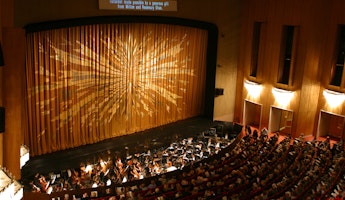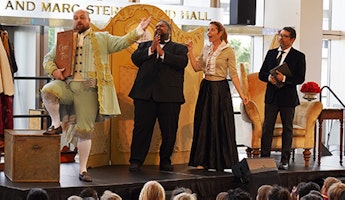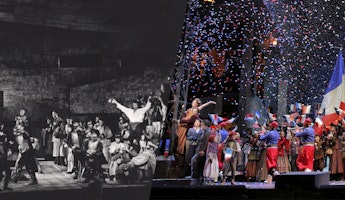Blog
February 12, 2024
Highway 1, USA": Exiled to America, Exiled in America
A Note from Music Director James Conlon on Highway 1, USA and The Dwarf
Part One: Exiled to America, Exiled in America
“I dream a world where man no other man will scorn, where love will bless the earth, and peace its paths adorn.” –Langston Hughes
“He who stands most remote from his age mirrors it best.” –Oscar Wilde
Alexander Zemlinsky fled the Nazi Regime, first from Berlin to Vienna, and then from Vienna to New York. His music had been banned, and there was no longer any possibility of continuing his public life as composer and conductor.
William Grant Still, born in Mississippi, was educated and lived his entire life in the U.S., the last 30 years in Los Angeles. Although his survival may never have been seriously in danger as an artist, he was consistently hampered and blocked by racial prejudice. Despite his prodigiously disciplined and inspired productivity, his merits as a composer have been undervalued.
These men, as far as there is any record, probably had no contact with each other, and may never have heard each other's music or even known each other's name. They were born only two decades apart, Zemlinsky in 1871 and Still in 1895. Despite their relatively contemporaneous lives, their music has almost nothing in common and would probably (at least on Zemlinsky's part) not have appealed to one another.
But Still and Zemlinsky are linked in other arcane and synchronistic ways, as are their operas Highway 1, USA and The Dwarf.
Langston Hughes (1901-1967), a leading figure and writer of the Harlem Renaissance, collaborated with Still on the libretto for the opera Troubled Island. Written in 1939 but not performed until 1949, it was a public success at the New York City Opera but dismissed and blocked by the New York press. Zemlinsky also set the words of Hughes. He wrote a song cycle in 1929 (dedicated to his recently deceased wife) for baritone and orchestra called Symphonische Gesänge [Symphonic Songs], which included four songs based on a German translation of Hughes poems.
In 1930, Still met Verna Arvey, a distinguished concert pianist and journalist. The daughter of Russian Jewish immigrants, born in Los Angeles and educated in Los Angeles public schools, she became his principal librettist and literary partner. They eventually married and remained together until the end of his life. She was, and her daughter Judith Anne remains, the greatest advocates of the composer's legacy.
In 1939, Arvey performed one of Still's solo works for piano and orchestra with the Los Angeles Philharmonic under the direction of conductor Otto Klemperer, a titanic force in classical music both before and after fleeing the Nazi regime in 1933. Klemperer had conducted the premiere of Zemlinsky's Dwarf at the Cologne Opera in 1922.
In addition to their prodigious composing careers, both Zemlinsky (in Europe) and Still (in the United States) were significant conductors in their different worlds. Still was the first Black American conductor to appear before a major American orchestra, conducting the Los Angeles Philharmonic in a concert of his own works at the Hollywood Bowl in 1936.
Quite aside from these coincidental links, the composers’ deepest indirect bond lies in the fact that their lives were negatively impacted, and the ultimate dissemination of their music blocked to varying degrees by prejudice and political and societal forces. In Zemlinsky's case, it was literally with genocidal intent, and in Still's case, metaphorically so. For an unacceptably long period, classical music lovers have been unjustly deprived of the pleasure and inspiration of hearing their music regularly.
The time to rectify past wrongs is always now. Both composers, and so many of their compatriots, deserve to be heard. We, the public and musicians, are fortunate to be able to enjoy their very different musical voices.
Highway 1, USA
Still's aesthetic is one that emphasizes a straightforward and direct contact with the common person in all of us. He rearticulated a famous phrase of Giacomo Puccini, "I write operas about the tragedies of little souls." (In my mind, I can even hear the distant strains of that Italian operatic giant in the American composer’s music.) Still has a moral cosmology, a sense of morality, of right and wrong, of fairness.
Highway 1, USA is not a tragedy, but neither is it a comedy, nor trivial. It has a hopeful ending, if not an unclouded one: a dream of a better life. It is a portrait of domestic life, in a domestic drama, placed in the small apartment of owners of a vintage gas station.
This was a period in American operatic theater—the era of Samuel Barber's Vanessa, Marc Blitzstein's Regina and Gian Carlo Menotti's The Medium—where the pendulum had swung away from the grandiose melodramas of the Italian 19th century and the excesses, mythology and superhuman themes of the early German 20th century.
In Highway 1, USA, Still pours his African American experience and soul into the mold, syntax and grammar of traditional and operatic convention. Taking heed of Antonín Dvořák's admonition to American composers to write music born from America's earth, taking inspiration from both Black and indigenous music, Still successfully fulfills that mandate. And in so doing, he mirrors Dvořák's own essential history, for Dvořák has poured his Czech soul into the canonic forms of the German classical tradition dominant in his time.
Still’s hopeful vision of humanity and the future transcends cultural experience, racial issues and societal tensions. His is a universal message. In stark contrast to Zemlinsky's The Dwarf — several times removed from our daily lives through the prism of Oscar Wilde’s exotic and highly original narrative, itself born of a painting by Diego Velazquez at the height of the Spanish Empire in the Court of Felipe IV of Spain — one could not imagine a greater contrast, style, world view, music, theatricality. But vive la différence! Stark contrasts make for great theater and illustrate the richness of opera.
Click here for Part Two: Zemlinsky's Time Has Come.
James Conlon is the Richard Seaver Music Director of LA Opera. This essay is partially revised and revisited from 2008. © 2024 James Conlon



/terenceblanchard_hero.jpg?format=auto&fit=crop&w=226&h=140&crop=focalpoint&fp-y=0&auto=format&auto=format)




/03-cosi/_dsc0996_pr.jpg?format=auto&fit=crop&w=345&h=200&auto=format)











/terenceblanchard_hero.jpg?format=auto&fit=crop&w=372&h=380&crop=focalpoint&fp-y=0&auto=format&auto=format)



